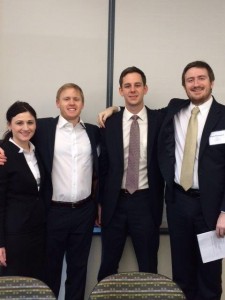Some Perspective from Five Marquette Lawyers Who Are General Counsel
You are the general counsel of a large corporation. Your company is involved in negotiations to buy a competitor and there are layers upon layers of complexity and risk. Is a lawsuit against the competitor a deal-killer or no big deal? Why is a key employee of the other company about to bolt for a third company? Business for your own company has been slipping. Do you need this deal to save your company or will the deal wreck what you do have? The questions—and the pressure—build.

Paul Dacier, L’83, outlined the scenario before a capacity audience in the Appellate Courtroom of Eckstein Hall on Feb. 20, and as he did so, he asked members of the audience how they would handle each step.
As Dacier’s story comes to a head: The CEO calls you into his office. “It’s just the two of you in the room and the CEO is sweating bullets,” Dacier says. He wants to know what you as general counsel recommend.

